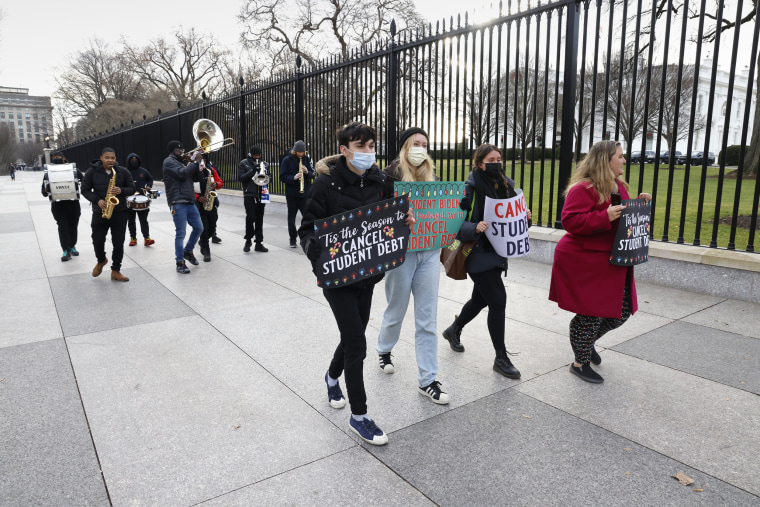WASHINGTON — The Biden administration is considering extending the moratorium on federal student loan payments just weeks before it is set to expire as the highly transmissible omicron variant of the coronavirus poses a new threat to the economy.
A spokesperson for the Education Department said Tuesday that the administration will announce "whether to extend the pause further" this week.
Administration officials said in September that they did not intend to extend the pause beyond the Jan. 31 deadline, warning borrowers that they should be prepared to resume payments in February. For weeks the White House has maintained that President Joe Biden would stick to the timeline, even as Covid case numbers began to increase and as inflation concerns began to grip the country.
White House press secretary Jen Psaki said earlier in the day that "the president has not made a decision yet."
Debt relief advocates and some Democratic lawmakers have pressured Biden to extend the moratorium, especially because his Build Back Better plan — which the White House has argued would lower costs for Americans — has failed to pass the Senate.
Rep. Alexandria Ocasio-Cortez, D-N.Y., tweeted last week that it was "delusional" to believe Democrats could get re-elected without acting on student debt relief, among other priorities.
The moratorium began in March 2020, when former President Donald Trump signed into law the CARES Act, which paused payments through September 2020 and eliminated interest rates for the roughly 42 million borrowers.
Trump later took executive action to extend the deferral period through January. Biden, on his first day in office, signed an executive order continuing it through Sept. 30.
The Biden administration extended the moratorium again in September, giving borrowers until Jan. 31 before they would have to resume making payments. The Education Department said at the time that it would be the "final extension" and that it felt that a "definitive end date" would reduce the risk of delinquency and defaults once payments restart.
The moratorium does not apply to borrowers with privately held loans.
The White House has said the Education Department is reviewing Biden's legal authority to wipe out student debt through executive action, but it has not provided a timeline for the review.
Biden has said that he does not believe he has the authority to cancel student debt unilaterally but that he would support Congress' passing a bill to cancel $10,000 in debt for each borrower.
Vice President Kamala Harris said in a recent interview with CBS News that she recognized that Democrats need to act on student debt before the 2022 midterm elections.
"I think that we have to continue to do what we're doing and figure out how we can creatively relieve the pressure that students are feeling because of their student loan debt," she said.

